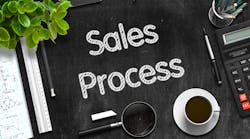Part one of this three-part series takes a close look at the knowledge and attitudes necessary to sell well.
Selling requires a professional approach. If you don''t use the right tools, you won''t rise to the top.
Not long ago I asked a sales and marketing executive for whom I have a great deal of respect whether he thought selling was a profession. He hesitated a moment, thinking. Then he responded, “Yes, I believe it is. Real selling draws on an expanding body of knowledge; it demands the conscious application of a wide variety of skills to ever-changing situations and, most important, it must be driven and supported by attitudes that will yield long-term success. That sounds like a profession to me.”
I couldn''t have put it better myself. Yes, selling is a profession, and in many respects, it is among the most challenging. But it''s not enough simply to call yourself a sales professional. If you wish to become a true professional, you must possess and effectively apply the professional''s tools. In other words, you must act like a professional salesperson.
What are these tools? What are these necessary elements that define the work of a sales professional? The first is knowledge — of your company, your products and services, your customers, your competition and your profession. Because this information changes and expands constantly, the gaining of knowledge must be a continuous process, an activity in which you are always engaged. You can never have too much knowledge.
Second in the set of tools is attitudes or frames of mind that must be developed and nurtured if you are to achieve consistent, long-term success.
Next come the skills that must be learned, exercised and refined continually. They relate to the way you deal with your customers during the selling situation.
And, finally, there are habits — learned behaviors that help you accomplish your work more efficiently and effectively. These tools — knowledge, attitudes, skills and habits — form a fitting acronym, KASH, a promise of what you and your company can expect when you apply them consistently and well.
To get a feel for these tools, to understand why they are important and how you can apply them effectively as a sales professional, let''s open your tool kit and examine each in turn.
KNOWLEDGE
Have you ever listened to people speak on a subject that they knew very little about? In most instances, the speaker''s ignorance is unmistakable, even when you don''t know the subject well yourself. Vague generalities, obvious hesitation, attempts to change the subject — all of these contribute to an impression that a speaker doesn''t know what he or she is talking about. This negative impression is the same as the one you will leave with your customers when you don''t possess the knowledge they expect.
Know your products and services.
For many customers, you — the professional salesperson — are a visiting expert. You are a trusted consultant they can call on for technical or other assistance related to your products and their applications. And because your customers pay for this expertise and assistance when they buy, you have an obligation to ensure they get their money''s worth. If your product knowledge is weak, if you don''t understand your customer''s applications, if you can''t address the benefits of your full range of services, then you do your company, your customers and yourself a disservice.
Product and service knowledge means doing your homework. It means knowing what your products will do and what they won''t do. It means being able to answer any reasonable question a customer might ask about them. It means never bluffing! When you don''t have the information requested, you should promise to obtain it and then keep that promise. It means staying abreast of changes and new technologies that affect your products.
Know your competition.
Your customers will always compare. They will compare products, services, prices, quality, personal treatment, attitudes — virtually every aspect of their dealings with you and your competition. You need to ensure that these comparisons stack up favorably. It''s not enough simply to be the best; the customer must believe you are the best.
You can''t influence the customer''s beliefs unless you understand the basis of his comparisons. Not only must you know your products and services — their features, benefits, disadvantages and applications — you must also be equally knowledgeable about competitive companies and their products and services.
Too many salespeople consider this an invitation to “knock the competition” by telling lies or half-truths. Such unethical behavior will only come back later to haunt you. Instead, develop your ability to draw honest comparisons between your offerings and those of your competitors, emphasizing your benefits and advantages, especially those of special interest to each unique customer.
Know your resources.
You can''t do it all yourself. Rapid advances in technology, complex and changing product applications and increased advances in technology, complex and changing product applications and increased customer demands have changed the nature of the professional salesperson''s work. No longer can you be the “one-man-band” who does all things for all customers. Instead, you must become an orchestrator. You must select and apply those of your company''s diverse human and material resources that can best solve your customers'' problems and satisfy their needs. And you must do so efficiently; that is, profitably.
Knowing your resources also means knowing your technical limitation. It means knowing who in your organization can best help you in dealing with your customers'' problems and questions. It means developing a working rapport with your in-house experts, selling them on the customers'' needs and helping them develop and maintain a strong customer focus. Only when you bring all your company''s resources into sharp focus to attack your customers'' unique problems can you truly orchestrate the sale.
Know your customers.
If you don''t know your customers, you are left with two options. You can treat them as “average” and offer canned presentations that ignore their unique problems and needs. Or you can try to size them up quickly and focus on what you hope will be their interests. Neither approach promises much in the way of success.
There is no substitute for knowledge of the customer. How well do you know your customers? Do you know their business objectives and goals, their decision-making process, their current and potential problems, their operations, their real and perceived needs?
Never forget that people, not companies, make purchasing decisions. How well do you know the people — the unique individuals who make up your accounts? Who has ultimate purchasing authority? Who are the key influences on purchasing decisions? Who are the users of your products and services? What are the unique problems, needs, objectives and goals of all of these people? What pressures do they currently face? What do they want for themselves? How can you help them as individuals?
Because your customers experience constant change in both their personal and business lives, your knowledge must reflect these changes. It''s particularly important to update yourself with your best and most established accounts, those customers with whom you are most familiar. Ironically, it is this familiarity that can cause you to overlook even the most critical and obvious changes. You need to keep current on your customers and their growth, problems and needs. Don''t fall into the trap of seeing them as they used to be; rather see them as they are today or, better yet, as they would someday like to be. Then, show them how you can help them achieve their goals.
ATTITUDES
Arming yourself with the kind of in-depth knowledge addressed above is important, but knowledge itself means little unless you have the will to use it. The will to do your job and to do it well — to succeed — is driven by your attitudes toward your work, your customers and yourself.
Commit to your customers'' success.
“We sell solutions to problems” is a common claim these days, but its overuse should not detract from its truth. It''s not enough to identify and understand your customers'' problems; you must also have a burning desire to help solve them. All too often the salesperson''s effort seems like a burning desire to make an immediate sale rather than a determination to help the customer fill a need, solve a problem or prevent future problems. Showing your customers that you are committed to helping them succeed will bring both orders and long-term market share.
Review your experience as a customer.
How often have you encountered a salesperson that was truly concerned about your problems and needs? Is it not the exception rather than the rule to encounter this sort of dedicated service? Take a lesson from those suppliers to whom you return consistently because they are really interested in you and provide professional, friendly and helpful service.
Develop self-confidence.
For the professional salesperson, self-confidence is indispensable. Without it, no real success is possible. But only you can develop self-confidence. No one else can give it to you. You can''t get it from a training program, a speech, a motivational tape, a book or your boss. These and other influences can only reinforce it. You develop true self-confidence through knowledge and experience by learning from your successes and failures and by perfecting your skills on the job.
Beware of overconfidence.
Any virtue, taken to the extreme, can quickly become a vice. Self-confidence is no exception. Many professional salespeople, blinded by success, have learned this lesson the hard way.
Most often, overconfidence leads to complacency, causing you to rely solely on what you have done for your customers in the past. This dependence on the strength of past relationships inevitably results in the kinds of mistakes that lead to lost business. Virtually every customer will, at some time, ask that fateful question (if only to himself), “What have you done for me lately?” If the answer is, “Not much,” then he will become easy prey for your competitors.
Overconfidence can also result from the personal relationships you develop with your customers. You may end up relying more on personal friendships than on the satisfaction of your customers'' business needs. A strong personal relationship can be a plus, giving you a real edge on your competition, but only if you continue to satisfy the customer''s product, service and economic needs. As one buyer told a salesperson (and close personal friend) after he gave his business to a competitor, “I love you like a brother, but your company is causing me too many problems.”
Fortunately, occasional failure is a wonderful cure for overconfidence, but only if you accept these failures for what they are and take the lessons they offer to heart. Learn from your successes and failures to come up with new ways of providing your customers with the satisfactions they seek, new ways to separate yourself from your competitors, new ways to make a meaningful difference. In other words, continue to earn your customers'' faith by going all-out for them.
Desire to be the best.
Be the best at what you do. After all, someone, somewhere is! Why can''t it be you? To think otherwise is to set negative goals for yourself.
Some years ago, a major corporation''s marketing organization was named the best in the world by many observers. There was good cause for this evaluation. The company continually challenged each person by demanding: “You will be the best at what you do.” They were given the necessary tools and resources; they were evaluated and rewarded accordingly. Admittedly, they were exceptional people, but their most obvious common trait was a strong belief in their ability to excel as individuals and as members of a team with common goals.
If others are performing better than you, don''t write off their success as the result of mere luck or internal politics or a better territory. Such sour-grapes attitudes never promote self-development. Instead, accept the fact that they are quite likely doing some things better than you. What are these things? How do they do them? How can you incorporate them into your own way of doing business? Don''t be too proud to ask for help. Select a mentor — your manager or an experienced salesperson with a track record of success — and take advantage of the coaching he or she can offer.
Believe in what you sell.
If the devil were truly diabolical, hell for a salesperson would be an eternity of selling products he doesn''t believe in for a company he despises. Personally, I can think of nothing worse.
If you don''t seem to believe in your company and its products, it will be noticed. If you appear to be indifferent to your offerings or to the customer, or if you project an image of sheer boredom on the job, you will affect your likelihood of making a sale. Your attitude has a real impact on how customers view you, your company and your products. Your attitude therefore, will have a direct impact on your success and ultimately on your bank account.
Not only must you believe in your company and what it offers, but you also must exhibit this belief. Enthusiasm and honest conviction are contagious and will infect your customers. Try it. It works!
Love your work.
Very few people enter sales in order to realize a lifelong ambition. I can''t recall ever having heard a 12 year old say, “I want to be a salesperson when I grow up.”
This prevailing attitude seems to reflect a societal ambivalence — and sometimes an actual hostility — toward selling and salespeople. And because this attitude is so pervasive, it can, unfortunately, infect even those of us in the profession.
Where did it come from? Sadly, from decades of unprofessional behavior by many of your predecessors who were far more concerned about getting their customers'' money than with helping them solve their problems. You can''t change the past, but you can affect the future by the way you approach the selling profession today.
Because a person generally performs best when engaged in activities he or she enjoys, it''s self-defeating to view selling solely as something you “have to do.” See it as the challenging profession it truly is. Today''s salesperson must not only be knowledgeable about a wide range of products and services, he or she must also be part psychologist, financial advisor, technical expert, intelligence gatherer and professional friend. Selling is a challenging profession and one in which you should take real pride.
Loving your work is realistic and rewarding. Take a new look at your job. Think of the value it brings to the economy, the opportunity it provides you to help others and the personal success you can achieve by doing it well.
Sell yourself.
Sell yourself, sell your company and sell your products and services — and do it in that order!
You, the salesperson, are the company to your customers. If they are uncomfortable in your presence or they don''t like you, they probably won''t like your company. They will then either fail to listen to you or won''t believe what you have to say about your products. It''s that simple Next month, we''ll examine on of the remaining tools in our sales professional''s tool kit: skills.
To be continued.







